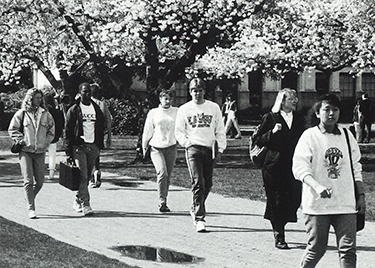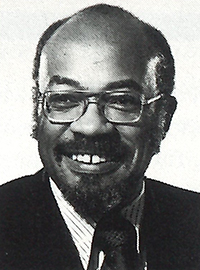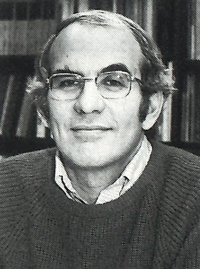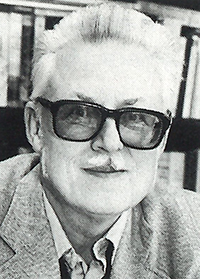Is a new ethnic studies requirement the path to harmony?

Photo by Mary Levin
Building a college-educated mind is much like building a structure, say traditional educators. Whatever the size or contents, this edifice must rest upon a solid foundation of study in mathematics, foreign languages, natural science, social science and the humanities.
But the substructure is cracking, say some. It needs a new foundation to prepare students for the 21st century. Others disagree. Perhaps just a slight remodeling of one wing is necessary, they say, while some preservationists argue there is no need to tinker with it at all.
It is time, the reformers say, to add an ethnic studies requirement to the foundation of a liberal education. To be an educated person in the coming century, each student must understand the dynamics of race in America, they maintain.
The “remodelers,” on the other hand, want to see some type of diversity course mixed into the University’s existing requirements in the humanities and social sciences. Then there are the “preservationists” who claim any ethnic studies requirement will backfire, weakening the instructional foundation and causing more racial animosity.
At the University of Washington, the idea of an ethnic studies requirement grew out of an ASUW report on racism. A faculty committee on curriculum is currently considering some type of undergraduate requirement, but as the idea wends its way through the Faculty Senate this spring, participants are wary that the issue might divide the campus, as it has other campuses across the nation.
The debate over the ethnic studies requirement is much more than just a quibble over a set of courses students must take. It is a debate over the nature of a liberal education, the power of education to change people’s minds, and even over the way racism works in society.
Those who favor a new requirement speak of racism in medical terms. Bigotry is a disease in the United States, they say, and the infection has spread rapidly over the last decade.
College campuses have not escaped this epidemic. Between 1985 and 1988 the U.S. Department of Justice reported more than 30 racial incidents on American campuses. Over the last five years a dormitory radio station at the University of Michigan broadcast ethnic slurs as “jokes,” a white fraternity at the University of Wisconsin held a “blackface” jungle party, a Duke University humor magazine depicted black food service workers as “lazy and unreliable,” and racial brawls broke out at the University of Massachusetts and Columbia University.
While the University of Washington has been spared the most extreme problems, the amount of racist graffiti has been increasing and one fraternity incident offended African American students. Even President Gerberding had to publicly apologize for a remark at an equal opportunity banquet that offended Hispanic American students. “The University as an institution is no more immune from the virus of racism than any other institution,” warns Public Affairs Professor Hubert Locke, who chaired a task force that recommended an ethnic studies requirement.

Hubert Locke
More importantly, the University has a powerful role as a gatekeeper in society, educating the people who will “call the shots,” he continues. “There isn’t much hope for this issue until you turn out a generation of Americans who think in fundamentally different ways about the question of race and ethnicity.”
Changing American demographics more than justify the ethnic studies requirement, the task force report notes. Today’s students will live in a world of increasing diversity. Already more than a quarter of the UW’s undergraduate population is comprised of minorities. As a further justification, the report cites the University of Washington’s mission statement, which calls for teaching “a sense of the values and experiences of past eras and other cultures.”
In testimony before the UW Faculty Council on Academic Standards, students supporting the requirement likened it to civics classes taken in high school. The proposal would give students “the skills and understanding necessary to act as responsible citizens in the United States,” said John Heller, a senior in engineering.
Later he added, “The University is about correcting incorrect ideas. … You can’t go through a biology class without ideas about creationism being challenged. We feel you shouldn’t go through an arts and sciences education without having ideas about racism challenged.”
Locke says there are two types of knowledge students should receive through the requirement. First, their general ignorance about racism should be addressed. Many people would not identify themselves as racists, yet may hold racist opinions without realizing it. Second, courses should fill in the gaps students may have about how ethnicity has shaped the history and culture of the United States.
As a result, the task force is calling for a two-part requirement totaling 10 credits. The first set of courses would explain the dynamics of racism and ethnic conflict. The second set would focus on the experience of ethnic groups in American society, specifically African Americans, Hispanic Americans, Native Americans, Asian Americans, American Jews, and Americans of Middle Eastern descent.
Other supporters may not embrace the task force’s 10-credit framework, but endorse the idea of some type of University-wide, undergraduate requirement. Medical Education Professor David Irby, who sits on the faculty council on curriculum, says students should be educated in “the diversity of the country and the world in which we live and in which our graduates will be working.”
He also notes that there is a new lode of scholarly research in ethnic history and culture that should be mined. “There is an emerging body of information which students and faculty ought to be aware of,” he says.
“Knowledge is never static and a discipline is not static. The faculty enlarges the boundaries of understanding,” said Provost Laurel Wilkening, who spoke to the faculty council Jan. 10. “There is a new scholarship in the area of ethnic studies. Eventually I have no doubt that more of this will find its way into the curriculum. The students are asking us to speed it up.”
While those who advocate a new foundation to a liberal education are outspoken, those who would remodel existing requirements are reluctant to speak out. Several professors contacted for this article refused to comment. Others just referred to their written statements on the issue.
Remodelers say their opposition is not racially motivated. Instead, they question the philosophy behind building a new, 10-credit requirement. In particular, they cringe when they hear proponents demand that the University “correct incorrect ideas.” Sociology Professor Charles Hirschman, who sat on the task force, filed a minority report over this issue.

Charles Hirschman
“Personally, I hope that knowledge of ethnic relations will make students better persons and less racist than many appear to be,” he wrote, “but that should not be the expressed goal of the University. As an institution, we are in the knowledge business and cannot design the curriculum to correct negative attitudes and behavior.”
Philosophy Professor Ron Moore, who was a member of the task force during its early deliberations, says proponents are incorrect if they think a requirement can “inoculate” students against racism. “I’ve taught a course in ethics, and it doesn’t make students more ethical,” he declares, adding that one of his ethics students at the University of Hawaii later committed a murder.
The political arguments of proponents also worry these faculty members. “I think it is very important to keep the intellectual justification for an ethnic studies requirement separate from the political justification,” Hirschman wrote. “The latter opens the door for University course requirements on many other issues of public concern.” Some professors fear that in the wake of an ethnic studies requirement, there will be a gender studies requirement, a sexual orientation studies requirement or an environmental studies requirement.
Moore and Hirschman also feel the task force proposal is too narrow. Focusing only on American minorities and their experiences is not “the best way to organize a curriculum on ethnicity,” Hirschman wrote. “I am not convinced that a better understanding of American society comes from courses that focus exclusively on this country.”
Moore adds, “There is nothing wrong in having people engage ‘the other,’ to open their eyes.” But he feels the curriculum should address a general xenophobia in society, “a fear of what is foreign in any way,” encompassing racism, sexism, homophobia and other forms of discrimination.
The philosophy professor, who faced curriculum battles when he was chair of the Faculty Senate in 1985, is also concerned that another requirement will “close down the aperture” for many students who have few electives to begin with. There will be no room for a student to diversify and experiment, he argues. Provost Wilkening also urged that any requirement should “build in new knowledge without adding more hours to a student’s load.”
The staunchest opponent of a new requirement is Sociology Professor Pierre van den Berghe, who has taught courses on racism and ethnicity for more than 20 years. “I’m not in the business of teaching good race relations,” he declares. “I’m in the business of teaching how different societies look at race and ethnicity.”

Pierre van den Berghe
This “preservationist” feels that tinkering with the academic foundation will weaken it. “I am certain that it will have the opposite of its intended effect,” he says of the requirement. “The issue is volunteerism. I’m not against having a multiplicity of courses with ethnic content. After all, that’s the way I earn my salary.
“But by forcing reluctant students to take courses of a specifically ideological attitude, it’s going to boomerang,” he says, warning of a rise in “racial antagonism” on this campus. If it is going to be useful, he adds, “trust people to pick up the skills on their own. Offer these courses and let the individual decide.”
He also says that such a requirement could cause “educational chaos” as departments scramble to offer enough courses to meet the demand. “They will hire half-baked graduate students practically off the street to teach half-baked courses to a captive audience,” van den Berghe warns.
The problems of financing a requirement worry all sides in the issue. Proponents feel the University must commit itself wholeheartedly to the idea, and if that means it must hire new faculty and launch new courses, so be it. But with signs of budget troubles coming from Olympia, those with reservations warn that this is not the time to start a new, mandatory program.
The courses must be required in order for them to have an effect, argues Locke. A liberal arts education changes over time. For example, computer literacy is now regarded as an important part of a college education. “Nobody quarreled with making that part of the curriculum,” Locke says. “Literacy about racism and racial conflict may be just as important to the future of American society as literacy about computers.”
As for the objections to correcting “incorrect ideas,” Locke says that has been the University’s business all along.
“Educating people makes a difference in the way people think and behave,” he says. “If we don’t believe that knowledge changes attitudes and behavior, then we ought to close down the University.”
Nursing Professor Anne Loustau, who heads the faculty council considering the issue, says any requirement is but a part of a larger University effort to make the campus more open to all ethnic groups. “It’s one tiny piece of an environment that we are trying to create,” she says, “a more comfortable environment for all students.”
The Faculty Council on Academic Standards has voted in favor of “investigating the possibilities” of a University-wide ethnic studies requirement for undergraduates. A preliminary report to the Faculty Senate Executive Committee is due this month. A vote by the entire Faculty Senate on the issue may come in May. If enacted, the requirement would probably begin with incoming freshmen in the fall of 1992.
A tale of two campuses
The University of Washington is not alone in the debate over these requirements. The squabbling has torn some campuses apart. At the University of Michigan in Ann Arbor, the proposal was debated for a year and a half and voted down twice before it was finally implemented. Even in its final form, the “diversity” requirement applies only to the liberal arts students at Michigan, who must take one course from a list of about 50, focusing on the meaning of “race, ethnicity and racism.”
In contrast, the University of Wisconsin’s requirement covers the entire university and was passed with little dissent in 1988. It also uses a “menu” approach, where students choose from a variety of courses on ethnicity and diversity. However, some faculty have criticized the diffuse range of offerings, such as “Black Film and Society” or “Jewish Civilization in Medieval Spain.”
The requirement at Wisconsin is part of an overall effort called the Madison Plan, which is aimed at recruiting and retaining minority students and faculty. Indeed, Ali Akbar, who is special assistant to the vice chancellor for academic affairs at Wisconsin, says that the requirement there has helped change a tense climate.
“Before, there was very little dialogue between students. It was like a clock, wound up and up. Now we have different groups in constant dialogue with the administration. We are able to defuse the time bombs,” he says.
The overall plan has also brought minority enrollment to an all-time high. “An ethnic studies requirement is better than having nothing, but I don’t think it is sufficient,” he adds.